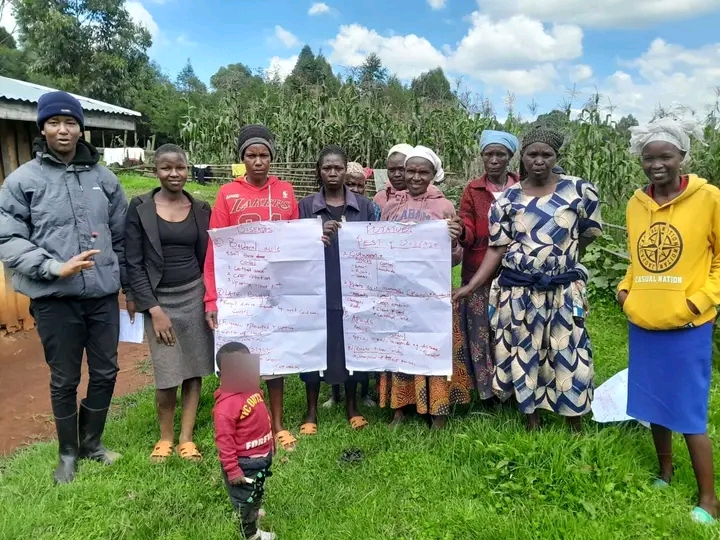
A section of Potato Farmers from Kuresoi Subcounty
Farmers from Kaprengero Testai Women Group and Tinet Koluu Self Help Group in Tinet Ward, Kuresoi South Subcounty, have been advised to embrace Integrated Pest Management (IPM) and good agricultural practices to enhance their productivity in the potato value chain.
Addressing the farmers, Subcounty Crops Officer Michael Nzesya emphasized the importance of adopting IPM strategies, crop rotation, use of certified seed varieties, and timely application of pest control measures. These practices, he noted, are essential in minimizing the impact of pests and diseases while reducing the overall cost of production.
“Effective pest management is critical to ensuring healthy potato crops. Severe infestations can not only lower yields but also result in malformed or diseased tubers that fetch lower prices in the market, directly affecting the farmers’ income,” said Nzesya during the training session.
The farmers were also taken through proper agronomic practices, including recommended planting techniques and strategies to manage common pests and diseases that affect Irish potatoes. The goal of the training was to equip the participants with the necessary knowledge to improve productivity and achieve better returns.
The move comes at a time when many small-scale farmers in the region are grappling with pest-related losses. With Irish potatoes being a key crop in Kuresoi South, adopting sustainable agricultural practices is expected to help farmers safeguard their crops and maintain steady incomes.
“We have experienced challenges with pests and diseases that reduce the quality of our produce,” said one of the participants from Kaprengero Testai Women Group. “This training is timely because it will help us understand the right techniques and practices to apply.”
Integrated Pest Management focuses on combining biological, cultural, physical, and chemical methods to control pests in a way that is both environmentally friendly and economically viable. The participants were encouraged to rotate crops to prevent the buildup of pests and diseases, use certified seeds to ensure healthy plants, and apply pest control measures at the appropriate time for maximum effectiveness.
By following these guidelines, the farmers are expected to cut down production costs and reduce dependency on chemical pesticides, contributing to sustainable farming in the region. The initiative aligns with the government’s broader efforts to promote food security through the adoption of sustainable agricultural practices.
The training also highlighted the importance of collaboration among farmers to share experiences and solutions to challenges in the potato value chain. The groups pledged to implement the knowledge gained and support each other in adopting best practices to ensure consistent and high-quality yields.
As the rainy season approaches, the farmers were urged to prepare early to take advantage of favorable conditions by planting certified seed varieties and ensuring their fields are free from pests and disease vectors.
With proper implementation, the training is expected to not only increase yields but also enhance the market value of potatoes from Tinet Ward, boosting the livelihoods of the women in the two groups.
“Empowering farmers through training on sustainable farming methods is a crucial step toward improving productivity and income levels,” Nzesya concluded.
The women’s groups expressed optimism about the future, saying they look forward to applying what they have learned to make their farming ventures more profitable and sustainable.
This initiative is expected to serve as a model for other groups in Kuresoi South and beyond, encouraging more farmers to embrace good agricultural practices that contribute to food security and economic empowerment.